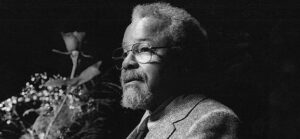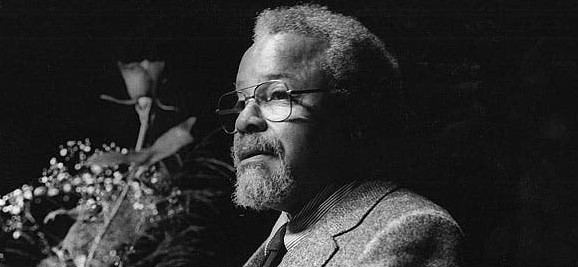
Lloyd George Richards was an African American film, theater, and video director. He was born on June 29, 1919, in Toronto, Ontario, but raised in Detroit, Michigan. Richards was only nine years old when his father died, which left his mother to raise five children during the Great Depression. Things got worse when his mother became blind. At thirteen years of age, he had to work to help his struggling family.
Richards attended Wayne State University in Detroit but enlisted to fight in World War II, where he served in the U.S Army in 1943–44. Richards returned to Wayne State University, became interested in drama, and learned all aspects of theater and radio production. After graduation, he started a theater group in Detroit with handful friends and classmates. Richards moved to New York City in 1947 to pursue an acting career and worked on Broadway and in radio throughout the 1950s. He also taught acting and directed off-Broadway. In 1958 Richards impressed Broadway critics with his production of Lorraine Hansberry’s A Raisin in the Sun. In the 1960s, he directed the Broadway productions: The Long Dream, The Moon Besieged, I Had a Ball, and The Yearling.
In 1966 Richards became head of the actor training program at New York University’s School of the Arts. He was also professor of theater and cinema at Hunter College in New York City before he was tapped to become dean of the Yale University School of Drama in 1979, and Artistic Director of the Yale Repertory Theater. Richards discovered and developed new plays and playwrights as artistic director of the National Playwrights Conference at the Eugene O’Neill Memorial Theatre Center, as a member of the playwrights’ selection committee of the Rockefeller Foundation, and with the New American Plays program of the Ford Foundation.
In 1984 Richards was searching for a new American playwright when he came across the production of Ma Rainey’s Black Bottom by August Wilson. Throughout the 1980s and 1990s, Richards directed the Yale Repertory and New York productions of August Wilson’s multi-part chronicle of African American life. The plays included Fences, Joe Turner’s Come and Gone, The Piano Lesson, Two Trains Running, and Seven Guitars. Richards’s productions for television included segments of Roots: The Next Generation, Bill Moyers Journal, and Robeson, a presentation of the life of African American actor and activist Paul Robeson, who was also an early inspiration for Richards. Robeson’s life and legacy were also Richards focus in the 1977 theatrical production, Paul Robeson.
Richards was the recipient of the Pioneer Award of AUDELCO, the Frederick Douglass Award, and in 1993 the National Medal of the Arts. He also served as president of the Society of Stage Directors and Choreographers. In 1991 Richards retired from his posts as dean of the Yale University School of Drama and as artistic director of Yale Repertory Theater. He continued to serve as artistic director of the Playwrights Conference at the O’Neill Center until 1999. He died of heart failure on June 29, 2006, in New York City on his eighty-seventh birthday.

